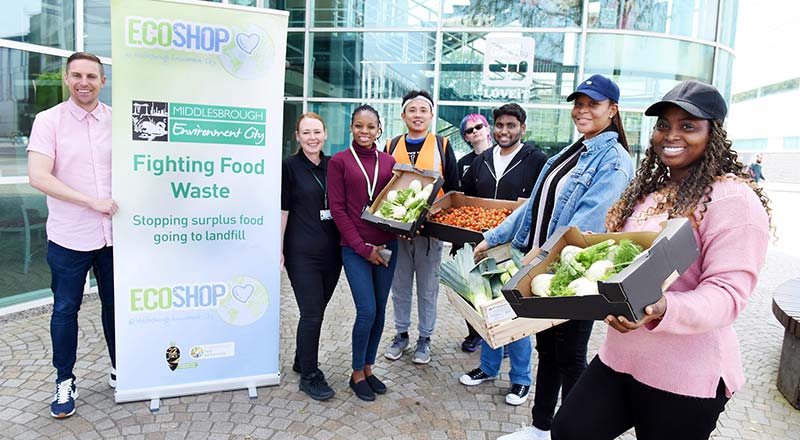Food waste initiative confirms University’s eco credentials
A new Eco-Shop which saved hundreds of kilograms of food from going to landfill is one of a number of initiatives securing Teesside University’s credentials as a pioneer of higher education sustainability.

The University has been awarded the EcoCampus Gold standard in recognition of its ongoing commitment to environmental sustainability.
The EcoCampus scheme evaluates the University’s environmental management, in line with the international management system standard ISO14001, alongside staff and student engagement and the overall corporate commitment to sustainability.
The pop-up Eco-Shop, which has been hosted at the University’s Students’ Union over the past few weeks, is a partnership between Teesside University, the Students’ Union and Middlesbrough Environment City and has proven such a success that it is hoped it will now become a permanent fixture in the next academic year.
Food was provided to the Eco-Shop by FareShare North East, a charity which takes surplus produce from retailers and producers and distributes it to community groups.
Students were offered the quality surplus food, in return for a small donation, helping them save money while combatting food waste.
Over the three weeks of the trial, the Eco-Shop was used by scores of students, and a total of 570kg of food was saved from going to waste.
Teesside University has placed sustainability at the core of its operations, which is one of the reasons it has achieved the EcoCampus Gold standard.
All new buildings being created as part of the ambitious £300m campus masterplan have achieved the BREEAM excellent sustainability standard and delivered a 10% biodiversity net gain across campus.
All energy used across campus is from green sources, and the University has also delivered a reduction of 49.2% in CO2 emissions and maintained a zero waste to landfill commitment.
It has also maintained a clear focus on delivering social value throughout the campus masterplan, embedding sustainable procurement practices, sourcing local labour and materials and creating new employment opportunities through the supply chain.
At Teesside, we ensure our commitment to sustainability goes beyond green initiatives and consider our wider operations as an ethical and responsible business.
Malcolm Page, Chief Operating Officer at Teesside University, said: “Teesside's approach continues to be recognised as gold standard. This is clear evidence of the importance the University places on ensuring it operates and develops in a sustainable manner.
“At Teesside, we ensure our commitment to sustainability goes beyond green initiatives and consider our wider operations as an ethical and responsible business.”
Stephen Goodall, Social Responsibility Officer at Teesside University, said: “Setting up the Eco-Shop involved a fantastic collaboration between the Students' Union, Middlesbrough Environment City, and the University.
“This project exemplifies our commitment to partnership working and provides students with access to affordable, quality food while reducing food waste.”
Femi Abolade, President (Welfare) at Teesside University Students’ Union, said: “The Eco-Shop is a great example of how the Students' Union can work with the University and external partners to provide valuable services to students.
“It addresses student concerns about affordability and healthy eating, all while promoting sustainability. It's a fantastic addition to our campus resources.”
Lisa Harris, Eco-Shop Coordinator at Middlesbrough Environment City, added: “We're delighted to partner with Teesside University to reduce food waste and offer affordable food options to students.
“Eco-Shops were set up to prevent food waste and change the understanding of environmental issues around food waste. This partnership is a great example of how communities can work together for a greener future."
